Silliness and the Undead - Zombieland: Double Tap
'Zombieland: Double Tap' was entertaining and fun at times, but not very evolved. It had poorly developed female characters and stereotypical characters of color.


Do you love a good heartbreaking cry within the first fifteen minutes of a movie? Then you will love Disney/Pixar’s Up! It’s a story of an unlikely friendship, and a reminder that it’s never too late to pursue your dreams, even when those dreams involve you accidentally kidnapping a neighborhood kid, crossing borders, and putting you both in very dangerous situations (just kidding, of course). If nothing else, Up is a catalyst for some important conversations about media representation and societal norms. Here are some of the topics that are worth discussing as you watch or rewatch this lovely movie.
My favorite part of Up is the love story between Carl and Ellie because Ellie is one of the most interesting and exciting characters in any children’s movie. We meet Ellie when she is a little kid, and she is the opposite of characters like Alice from Alice in Wonderland. She is scrappy, adventure-seeking, smart, and fun; but she is still nurturing and open-minded to young Carl. She leads Carl out of his fears and loneliness. There is a quick montage through their life together, and it is lovely — even the lows. The first set of tears will grace the viewer’s face when Carl and Ellie go through an assumed miscarriage. After recovering from that horrible experience, they move on to their lives together as a couple until the devastating death of sweet Ellie.
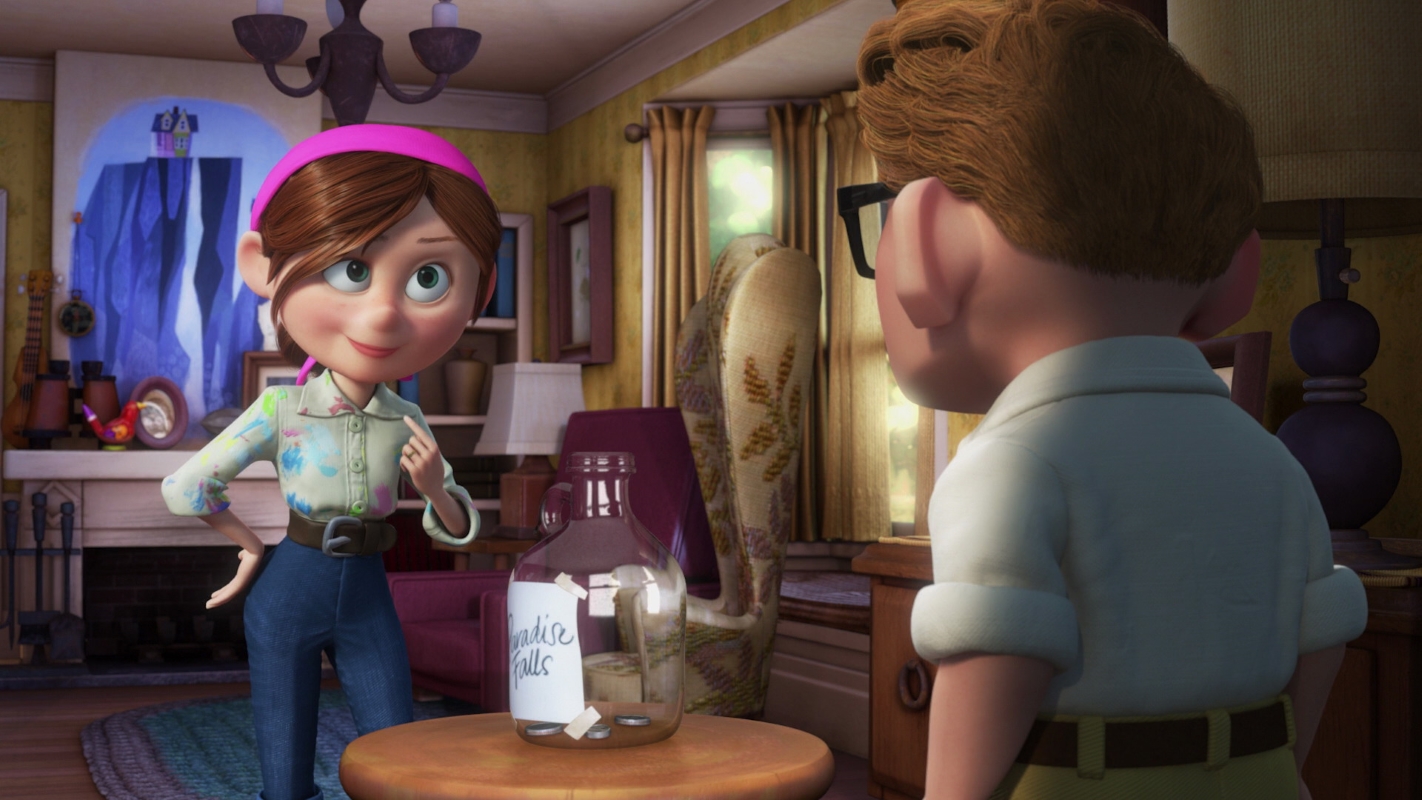
As Linda Holmes writes in an article for NPR, why can’t we have a movie about Ellie? In 2009, when Up was released, we hadn’t been fed any animated female leads who weren’t princesses. Ellie would have been a perfect choice to lead this revolution! Six years after Up was released, we were given Inside Out, which has female protagonists who are not princesses and are just as sweet as Up, so moves are slowly being made. Maybe next there can be a… dare I say it… Black, non-princess hero? Fingers crossed!
Russell is #1 adorable, #2 sensitive, #3 empathetic. He warms Carl’s cold heart and somehow creates the relationship that they both need. Perfect timing! Russell says things like, “That might sound boring, but I think the boring stuff is the stuff I remember the most.” Uggghhh! I think about this quote a lot while quarantining with my small children. He is going through a lot, including grief of his own, but isn’t resentful or mean as a coping mechanism. Kids are so adaptable and resilient, and Russell is no exception. He expresses himself well and doesn’t put any false pressure on anyone — not Carl or his mother. Kids are not as naive and immature as we, adults, tend to assume they are, and sometimes the adults are the stubborn, short-sighted, immature ones.

Russell was modeled after Peter Sohn, a Korean-American creator at Pixar. Russell is voiced by Jordan Nagai, a Japanese-American actor. This is a rare and wonderful casting by Pixar. Historically, Asian characters in cartoons are represented in racist and stereotypical characters, as I wrote about in my Abominable review here.
One of the few minor cringe-y moments in this beloved film is actually at the end. Male role models are so important in kids’ lives, and family does not have to be biological, as Up shows. However, I hope that Up wasn’t implying that moms can’t be wilderness experts or support boy scout-type activities. Again, this is a small cringe because showing up for your chosen family is so beautiful and important. But why didn’t Russell’s mom get on that stage?
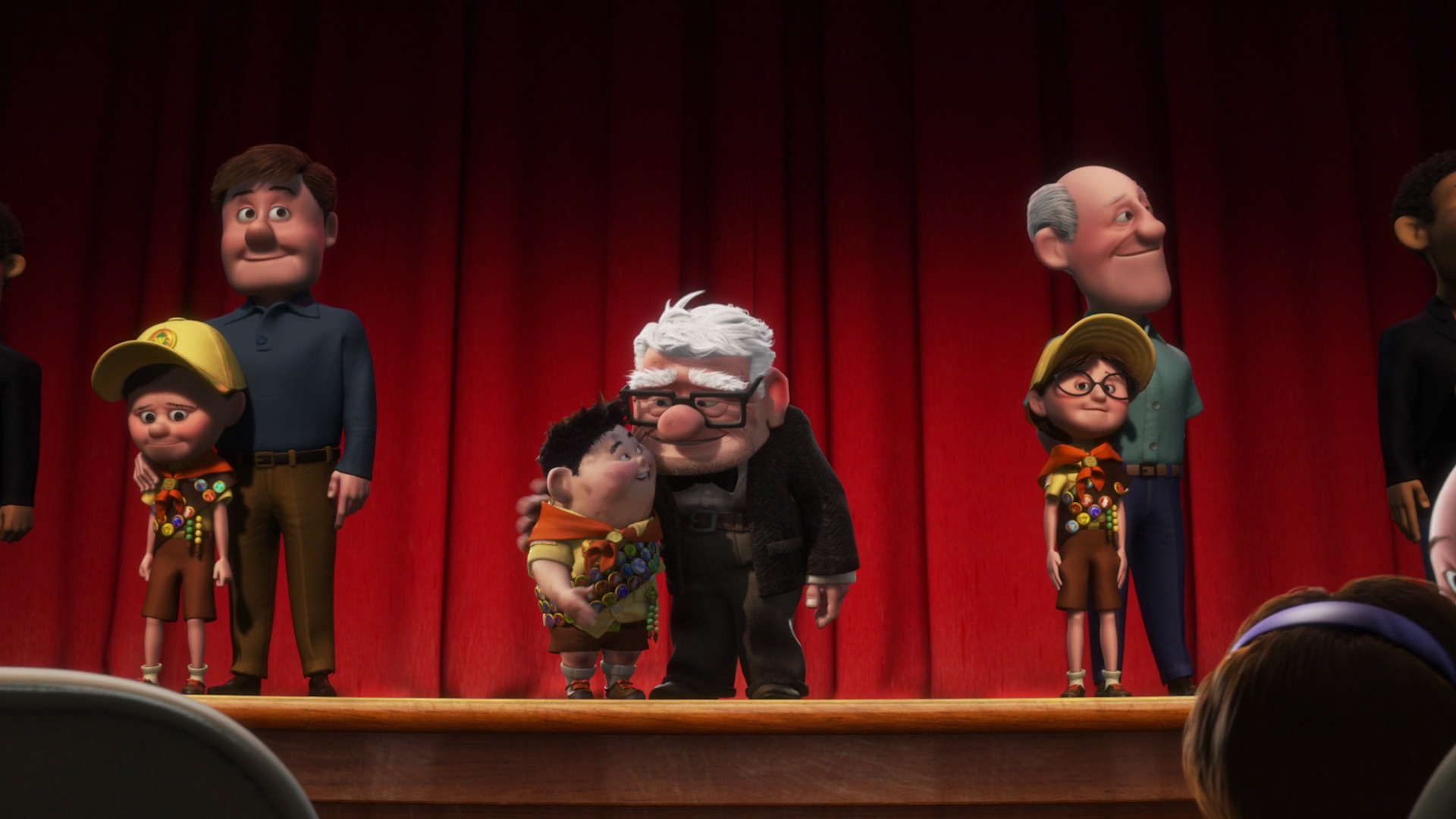
When Russell and Carl meet this exotic bird, Russell names the bird “Kevin.” Later, Kevin lays eggs, and Russell exclaims, “Kevin’s a girl!” This is important for two reasons. First, don’t assume anyone or anything’s gender. And second, who cares if a girl is named Kevin? After the reveal of Kevin’s biology, the characters still refer to her as Kevin because… who cares? We thought Kevin was a male, and it turns out Kevin is a female. Does that change anything? Not for the characters, and hopefully teaches the audience how easy it is to accept gender fluidity. Is this a reach? Maybe. But every little drop of tolerance helps.
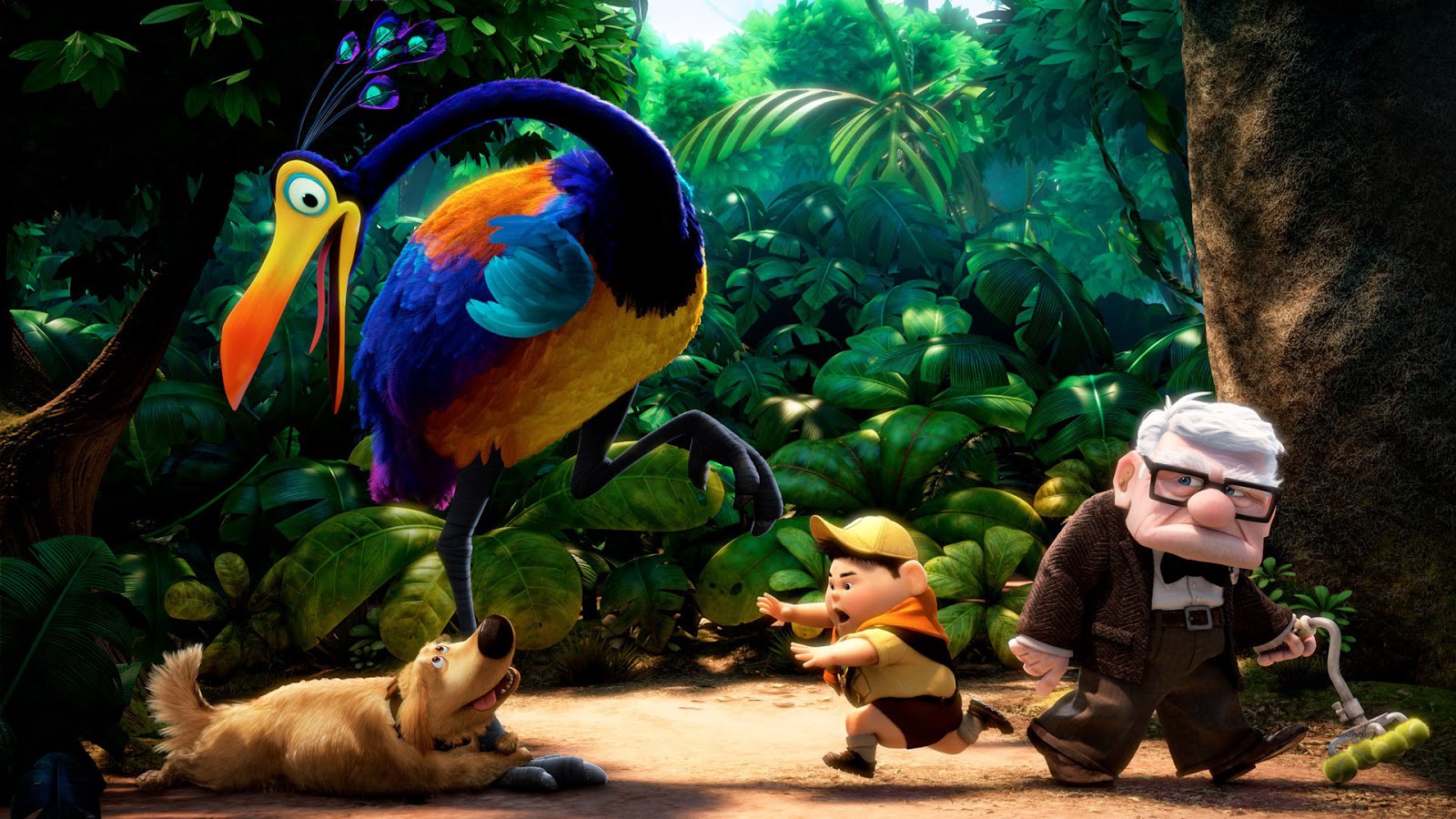
It is always sad when the inevitable character dies in a Disney movie. However, never has the grieving process been so heartbreaking in a children’s film. If The Lion King followed Sarabi after Mufasa was killed, I think it would be as heartbreaking as Carl grieving for Ellie. At least Sarabi had a pride with her to work through it (I assume they would help — they seem very supportive). Carl is alone.
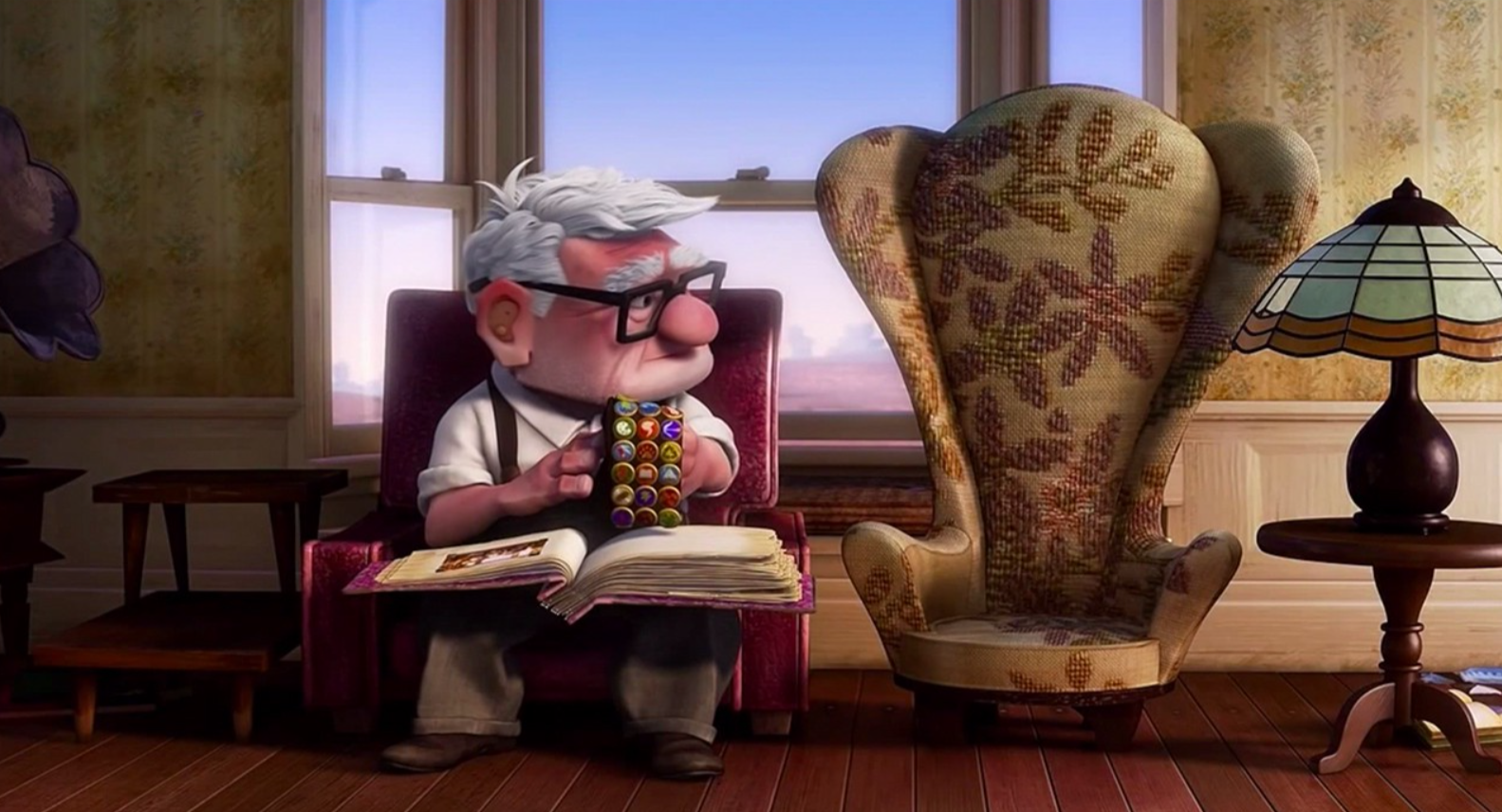
Not only is Carl alone, but he is fighting with developers to keep the last bit of happiness that he built with Ellie. They had no children, so the house is like a piece of her, and a symbol of their shared dreams. This is a ripped-from-the-headlines story! Apparently, there was a woman in Seattle who refused to sell her home of over 50 years to developers who would demolish it. For more on the real house, read this Seattle Times article by Jayson Jenks.
Getting old sucks. Being poor sucks. The old and poor in America are simply forgotten. Carl is a representation of this. Sure, he is grumpy and hard to get along with. But he is all alone and broken-hearted AND feels that he is trying to be erased by these developers. I would be grumpy too! I think more than that, he is an example of how older folks are treated in this country. Once you are no longer part of the economy, you are tossed aside.
Dug is the absolute hero. He is the perfect representation of dogs in real life: unconditional love, loyalty, and sweetness. While Russell and Carl have a sweet relationship in the movie and end up loving one another; ultimately, Russell starts their relationship by needing something from Carl (the elderly patch). Dug immediately loves Carl and tells him through words and kisses with no expectations. Dug instantly realizes that the bad guy is bad and switches sides to aid the good guys. Because he is a good boy.
Dug is the opposite of crotchety Carl, and softens Carl enough for him to bond with Russell, to unload his grief baggage, and to open himself up to happiness again. You can’t argue with unconditional love poured upon you, and Dug gives this to Carl.
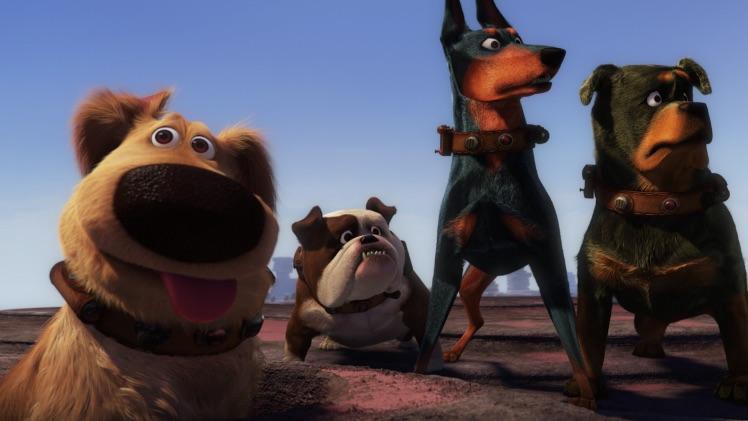
Up is a great, feel-good movie to (re)visit this summer. I know I have tried to tie balloons to my house and get the hell out of this country a few times over the past four years, so it is fun to live vicariously through Carl. In conclusion, be like Dug: It’s okay to realize that you’ve been loyal to the wrong person and to vocalize your feelings for others; give us more Ellie-style stories; Russell is amazing; and if all else fails, sail away in your balloon-powered house.
(This article was originally published by Sarah Erskine on Medium.)
Related lists created by the same author
'Zombieland: Double Tap' was entertaining and fun at times, but not very evolved. It had poorly developed female characters and stereotypical characters of color.
Related diversity category
Billy Eichner provides a hearty dose of good old fashioned romance with a lot of laughs